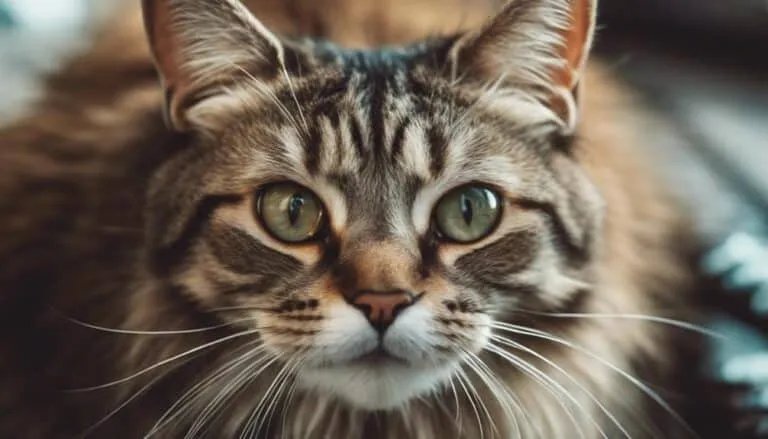The Best Fluffy Pancakes recipe you will fall in love with. Full of tips and tricks to help you make the best pancakes.

In the vast animal kingdom, the power of scent holds a remarkable influence over the behavior and survival of countless species. Male cats, in particular, possess an awe-inspiring ability to detect the enticing scent of a female in heat from remarkable distances. This extraordinary olfactory prowess allows them to navigate their surroundings with uncanny precision and embark on a quest to find potential mates.
However, with this natural instinct comes inherent risks to their safety and well-being. The world of male cats on the prowl is captivating but also fraught with dangers. Today, we will dive into this world, exploring the breadth of their scent detection capabilities and the implications it has on their behavior.
Join us as we unravel the secrets behind their amazing scent power. By shedding light on the importance of understanding, managing, and ensuring the happiness and safety of these fascinating feline creatures, we can gain a deeper appreciation for their unique abilities and the challenges they face.
Key Takeaways
- Male cats can sense a female cat in heat from about a mile away.
- Neutering is the best way to prevent male cats from escaping to find a female and ensures their safety.
- Neutering male cats eliminates or reduces marking and spraying behavior.
- Keeping male cats indoors, regardless of whether they are neutered or not, reduces the chances of them getting injured or lost while searching for a female.
Male Cats' Incredible Scent Detection
Male cats possess an extraordinary ability to detect the scent of a female cat in heat, allowing them to navigate their environment with remarkable accuracy and precision. Scent plays a crucial role in the lives of male cats, serving various purposes such as communication, territory marking, and aggression.
Scent marking is an essential behavior in male cats, as it allows them to establish and maintain their territory. By depositing their unique scent through urine, scratching, and rubbing, male cats send signals to other cats about their presence and boundaries.
Additionally, scent also plays a significant role in male cat aggression. The presence of unfamiliar scents can trigger aggressive behavior in male cats, as they perceive these scents as a threat to their territory.
Understanding the importance of scent marking and the role of scent in male cat aggression is crucial for providing appropriate care and managing their behavior effectively.
The Role of Pheromones in Male Cat Behavior
Pheromones play a crucial role in shaping the behavior of male cats, influencing their interactions with other cats and their environment. These chemical signals, released by the cat's body, have a significant impact on male cat behavior, particularly in the context of mating rituals.
Male cats use scent marking to communicate their availability to potential mates and establish territory. The scent left behind contains pheromones that signal their reproductive status and attract female cats in heat.
Additionally, pheromones released during mating serve to enhance the bond between male and female cats.
Understanding the role of pheromones in male cat behavior can help cat owners better manage their pets' reproductive instincts and ensure their safety and well-being.
How Male Cats Use Scent to Communicate
Scent plays a crucial role in the communication of male cats, allowing them to convey important information to other cats in their environment. Male cats use scent marking as a way to establish their territory, attract mates, and communicate with other cats. Pheromones, chemical substances produced by the cat's body, are the main components of these scent signals.
When a male cat marks his territory with urine or by rubbing against objects, he releases pheromones that signal his presence and ownership of the area. Neutering, the process of removing the testicles, can have a significant impact on male cat scent marking behavior. Neutered male cats tend to mark less frequently and with reduced intensity, as the removal of the testicles decreases the production of testosterone, which is responsible for stimulating scent marking behavior.
The Fascinating Connection Between Scent and Mating
The intricate relationship between scent and mating in male cats reveals a captivating realm of communication and reproductive strategies.
The impact of scent on male cat behavior is a fascinating area of study that sheds light on the influence of scent on mating rituals. Male cats possess scent glands located in various parts of their bodies, including the face, paws, and tail. These glands produce pheromones, which are chemical signals that communicate information to other cats.
During mating season, male cats utilize their scent markings to attract females and assert dominance over other males. By leaving their scent through urine marking, rubbing, and scratching, male cats create a scent trail that can be detected by females from a considerable distance away.
This scent-based communication plays a crucial role in the reproductive strategies of male cats, enabling them to navigate their environment and increase their chances of successful mating.
Understanding the Territorial Instincts of Male Cats
Male cats exhibit strong territorial instincts as a means of establishing and maintaining their presence in a given area. Understanding these instincts is crucial for ensuring their well-being and the safety of the community.
The dangers of male cats roaming include the risk of getting hit by a car, getting lost, or engaging in fights with other cats. Indoor living provides numerous benefits, such as reducing these risks and preventing the overpopulation of stray cats.
Pheromones play a significant role in male cat behavior and communication. These chemical signals, released through urine marking and rubbing, help males establish their territories and communicate with other cats.
Male Cats' Ability to Detect a Female in Heat
The olfactory prowess of male cats enables them to detect and locate females in heat with remarkable accuracy. Male cats have a highly developed sense of smell, which plays a crucial role in their ability to detect and respond to the scent of a female in heat.
The impact of scent on male cat behavior is significant, as it triggers a range of instinctual responses that drive them to search for and mate with a receptive female. Male cats can sense the pheromones released by a female in heat from a considerable distance, often up to a mile away. This keen sense of smell allows them to navigate their environment and follow the scent trail to find potential mates.
Understanding and respecting the male cat's natural instincts and providing appropriate measures, such as neutering, can help ensure their safety and well-being.
The Risks Male Cats Face When Searching for a Mate
Male cats face various dangers and risks when they embark on the search for a mate. These risks of outdoor mating behavior can have serious consequences for the well-being of male cats. Here are three key risks they face:
- Injury: Male cats may encounter aggressive rival males while searching for a mate, leading to fights and potential injuries. These injuries can range from scratches and bites to more serious wounds that require veterinary care.
- Accidents: When in pursuit of a female in heat, male cats may become distracted and unaware of their surroundings, increasing the likelihood of accidents. They may wander into high-traffic areas or encounter other hazards such as cars or predators.
- Getting Lost: Male cats may become disoriented or lost while searching for a mate, especially if they venture into unfamiliar territory. This can result in extended periods without food or shelter, increasing the risk of starvation, exposure, or becoming prey to predators.
To prevent these risks, it is crucial to employ strategies for preventing male cat escapes. Neutering the male cat is highly recommended, as it reduces the urge to roam and search for a mate. Additionally, keeping the male cat indoors provides a safe and controlled environment, minimizing the chances of accidents, injuries, or getting lost.
The Benefits of Neutering Male Cats
Neutering cats is a widely recognized and recommended practice for promoting the health and well-being of feline companions.
When it comes to male cats, neutering has several benefits. One of the significant impacts of neutering on male cat behavior is the reduction or elimination of marking and spraying behavior. This behavior is often associated with the male cat's instinct to mark their territory and attract females.
Neutering also reduces the chances of male cats getting injured or lost while searching for a female in heat. Additionally, neutering decreases the likelihood of fights with other cats, which can lead to injuries and the transmission of infectious diseases.
In the long term, neutering male cats contributes to a longer and healthier life, as it reduces the risk of certain health issues such as testicular cancer and prostate problems.
Tips for Keeping Male Cats Safe and Secure
After discussing the benefits of neutering male cats, it is important to consider practical tips for ensuring the safety and security of these feline companions. Here are three essential tips to keep male cats safe:
- Provide indoor enrichment:
Male cats need mental and physical stimulation to prevent boredom and destructive behavior. Create a stimulating environment with scratching posts, interactive toys, and climbing structures. Puzzle feeders and treat-dispensing toys can also keep them engaged and mentally stimulated.
- Use training techniques:
Training can help keep male cats safe by teaching them basic commands and preventing unwanted behaviors. Positive reinforcement techniques, such as using treats or praise, can be effective in teaching cats to come when called or stay away from dangerous areas. Training also strengthens the bond between the cat and their owner, enhancing their overall well-being.
- Ensure a secure environment:
Make sure your home is safe and escape-proof for your male cat. Check for any potential hazards like open windows or doors, and securely close off any access points to the outside. Installing window screens and keeping balcony doors locked can prevent accidents or escapes. Additionally, consider microchipping your cat and providing them with a collar and identification tags for added security.
The Importance of Responsible Pet Ownership and Neutering
Responsible pet ownership and the practice of neutering play a crucial role in ensuring the well-being and welfare of male cats. Irresponsible pet ownership can have a detrimental impact on the cat population, leading to overpopulation, stray cats, and overcrowded shelters.
Education plays a significant role in promoting responsible pet ownership and the importance of neutering. By educating pet owners about the benefits of neutering, such as reducing marking and spraying behavior, decreasing the chances of injuries and fights, and controlling the population of unwanted kittens, we can encourage them to make informed decisions for their male cats.
Additionally, education can help dispel myths and misconceptions surrounding neutering, addressing concerns about its impact on a cat's behavior or health. By promoting responsible pet ownership and neutering, we can ensure the well-being of male cats and contribute to the welfare of the cat population as a whole.
Conclusion
In conclusion, male cats possess an extraordinary sense of smell that allows them to detect the scent of a female in heat from a considerable distance. This remarkable olfactory power plays a crucial role in their survival and behavior, but can also pose risks to their safety and well-being.
Neutering male cats is an effective solution to prevent them from wandering in search of mates, ensuring their safety and happiness, while also benefiting the community at large. Responsible pet ownership and neutering are vital in promoting the welfare of male cats.








